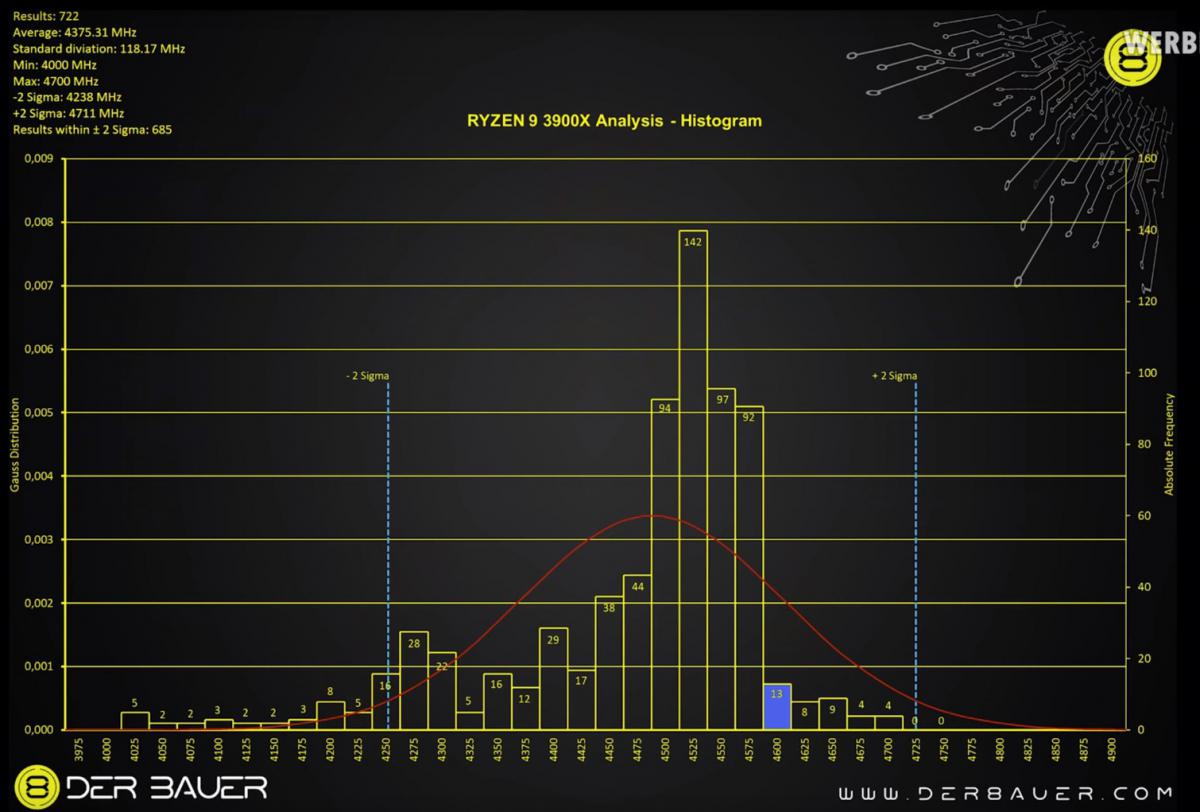A few weeks or so we reported that the AMD Ryzen 3000 series boost clocks can vary quite a bit, even per motherboard manufacturer. In that same timeframe overclocker Der8auer requested users to send in data, basically collecting what boost clocks they achieve on a single thread.
The results are in, it seems specifically a 5.5% for the Ryzen 9 3900X processors jumps stay in the logical spectrum e.g. does did reach the advertised single thread boost speed. To determine the maximum boost clock, everybody that joined in has been asked to run single-threaded Cinebench R15 and then verify the clock speed using the HWInfo tool. Herein already a bit of an issue can be found, as running the two together can already spawn multiple threads on load.
In total, a number of 2,700 processors have been tested and results collected and yes, 5.5% of the Ryzen 9 3900X achieved the advertised boost clock of 4.6 GHz. The majority of procs stay within 4.5 and 4.75 GHz. You should also be aware that 68% of the test results indicate a boost of 4.5 GHz or better, however, 32% did not. And that last bit I would agree, is weird.
Are the results reliable?
While the test itself is pretty self-explanatory, some questions do arise. The test are consumer-based, ergo Der8auer has had no control over the test group. Simple things can influence that data; type of cooling used (which matters for Ryzen), neither is there an overview of how the motherboards are configured, or even if the advised Windows Energy settings mode and AMD chipset software is installed. Also, an inexperienced end-user might forget that applications run in the background and always need tyo be halted - if they did not do so it might have triggering other threads and thus lowering clocks. Also, in the weeks that Der8auer (Germany based) asked for the test results, there was a heatwave here in the EU, all these small factors can and will have an effect on performance one way or the other. Last but not least, probably some folks at intel read about the request and entered data as well? Who knows right? That's the problem with public data.
So are the results reliable? Well, it's a pretty good indication but not 100% reliable due to the aforementioned reasons. Then again, the number of entries make the results certainly statistically significant. The test does show there is something going on alright, the chips should be able to boost to its maximum advertised frequency (or at least close towards it in the 4.5+ GHz realm.).
Does this affect your performance?
No, all measurements to date are valid, if there is something going on, then the perf is the same as previously. If a chip is slower, then it also was that during any testing. It works vice versa, results could only become faster. Ryzen 3000 is a complicated processor. AMD already has explained in-depth that there are many variables in play that determine the Turbo single thread bin. The right thread also needs to be prioritized towards the fastest / best core, as not all cores are equal.
Der8auer: "Good number of Ryzen 3000 chips does not reach advertised boost clock"



